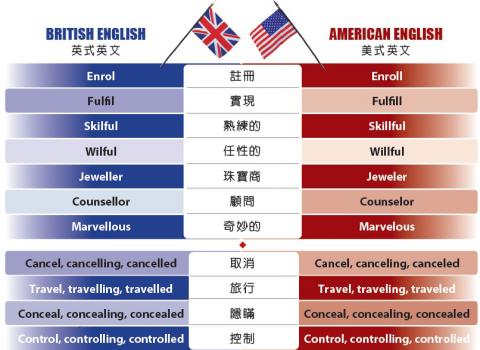There are certain spelling rules and conventions governing the doubling of the letter “l” in certain words in English, with differences between American and British English.
First of all, there are certain words that take a double “l” in American spelling that have a single “l” in British English. These include the verbs enroll, fulfill, instill, install and distill, whose British English variants are enrol, fulfil, instil, install and distil; and the adjectives skillful and willful, in which the double “l” of the root is dropped in British English, giving us skilful and wilful.
Bucking this trend are certain nouns and adjectives in US English that favor a single “l,” whereas British English prefers a double “l.” Thus we have jeweler, counselor, woolen and marvelous in American English, compared to jeweller, counsellor, woollen and marvellous in British English.

Finally, there are rules for adding -ed and -ing endings to verbs of more than one syllable ending in “l”, such as cancel, travel, retail, annul, level, conceal, quarrel, libel, control, overhaul and patrol.
In American usage, the final “l” is not doubled when the stress falls on the first syllable. This gives us canceled, traveling and libeling in American English, but cancelled, travelling and libelling in British English.
Verbs such as annul, control and patrol do not have the stress on the first syllable, so the “l” is doubled in both American and British English, giving us annulled, controlled and patrolled.
With these rules, in British English the “l” is always doubled.There is one important exception to this, however: when the vowel preceding the “l” ending is a diphthong — such as ea, ai and au — the “l” is not doubled, irrespective of where the stress falls. So, with conceal, retail and overhaul, the “l” is not doubled in either American or British English.
(Paul Cooper, Taipei Times)
有些英文單字,其中的「l」是否要重複一次而拼成「ll」,取決於特定拼寫規則及慣例,這在美式及英式英文中也有所不同。
首先,某些字裡的「l」,美式的拼法為「ll」,英式則是只有一個「l」,例如動詞「enroll」(註冊)、「fulfill」(實現)、「instill」(注入)、「install」(安裝)和「distill」(提取);這些字在英式英文則是拼為「enrol」、「fulfil」、「instil」、「install」和「distil」。形容詞「skillful」(熟練的)及「willful」(任性的),其英式拼法是將字根中的「ll」省略為「l」,而為「skilful」及「wilful」。
有的字反其道而行,例如某些名詞和形容詞的美式拼法傾向用單個「l」,在英式英文則偏向用「ll」。因此,美式英文的「jeweler」(珠寶商)、「counselor」(顧問)、「woolen」(羊毛)和「marvelous」(奇妙的),在英式英文是拼為「jeweller」、「counsellor」、「woollen」和「marvellous」。
最後,以字母「l」結尾、有多個音節的動詞,其後若要加上字尾「ed」或「ing」,也有特定規則,例如「cancel」(取消)、「travel」(旅行)、「retail」(零售)、「annul」(廢除)、「level」(弄平)、「conceal」(隱瞞)、「quarrel」(爭吵)、「libel」(誹謗)、「control」(控制)、「overhaul」(徹底檢修)和「patrol」(巡邏)等字。
在美式用法中,這些以「l」結尾的字若重音在第一音節,字尾的「l」就不會重複。因此美式的「canceled」、「traveling」、「libeling」等字,不同於英式拼法的「cancelled」、「travelling」及「libelling」。
動詞「annul」、「control」 及「patrol」的重音都不是在第一音節,因此加字尾「ed」與「ing」時,其美式與英式之拼法相同,都要重複字尾的「l」而成「ll」,為「annulled」、「controlled」及「patrolled」。
在英式英文中,所有以「l」結尾的字,加字尾「ed」、「ing」時,一律重複為「ll」。上述規則有一重要的例外:以「l」結尾的字,若「l」之前是雙母音(例如「ea」、「ai」和「au」),便不須重複「l」,無論該字重音在哪個音節。因此,「conceal」、「retail」、「overhaul」等字,字尾的「l」在美式及英式英文中都不會重複。
(台北時報林俐凱譯)

A: Apart from the Taipei Music Center’s exhibit and concert, US pop rock band OneRepublic and rapper Doja Cat are touring Kaohsiung this weekend. B: OneRepublic is so popular that after tonight’s show at the K-Arena, they are set to return to Taiwan again in March next year. A: And Doja will also perform at the same venue on Sunday, right? B: Yup. Her collab with Blackpink’s Lisa and singer Raye for the song “Born Again” has been a huge worldwide success. A: Doja even made it on Time magazine’s “100 Most Influential People” list in 2023. She’s so cool. A: 本週末除了北流的特展和演唱會外,美國男團共和世代和饒舌歌手蜜桃貓朵佳也將來台開唱。 B: 共和世代因太受歡迎,繼今晚高雄巨蛋的演唱會後,預計明年3月即將再度來台巡演唷。 A: 朵佳本週日將在同場地開唱,對不對?

Tango unfolds in a dimly lit room, where a haunting melody ushers two dancers into a close embrace. Here, music and movement merge into a silent yet passionate conversation, expressing longing, memory and shared purpose. What makes tango truly magical is the deep interaction and spontaneous improvisation between partners. Tango began in the late 19th century in Buenos Aires, Argentina’s bustling capital. Born in the poor working-class neighborhoods and busy port areas, this dance emerged from a melting pot of cultures. European immigrants, African slaves and local residents all contributed to its unique character. From these rich influences, tango

A: What show are you watching online? B: I’m watching “Fly Me to the Moon & Back” – an exhibition launched by the Taipei Music Center (TMC) to commemorate the late singer Tom Chang. A: Known for his sky-high notes, Chang is praised as one of the best singers in the 1990s. His death at the age of 31 was a major loss indeed. B: And I’m so glad that we went to the TMC’s 90s-themed concert last Friday. I finally saw the iconic “Godmother of Rock” WaWa perform live. A: This year-end show also featured singers Princess Ai, Bii, Wayne Huang, PoLin and

Just like fingerprints, your breathing patterns may serve as a definitive identifier. In a recent study, scientists have demonstrated an astonishing 96.8% accuracy in identifying individuals based on their respiratory patterns. This revelation could open up new possibilities in biometrics and personalized health monitoring. The notion of using individual breathing patterns as a distinct biological signature has long been a topic of discussion within the respiratory science community, yet a practical method for measurement remained elusive. This changed with the invention of a tiny, wearable device capable of extended recording. Researchers deployed a lightweight tube designed to fit inside